K8S 中 kubectl 详解
Posted 爱show的小卤蛋
tags:
篇首语:本文由小常识网(cha138.com)小编为大家整理,主要介绍了K8S 中 kubectl 详解相关的知识,希望对你有一定的参考价值。
文章目录
一、资源管理办法
1.1 陈述式资源管理方法
- kubernetes集群管理集群资源的唯一入口是通过相应的方法调用apiserver的接口
- kubectl 是官方的CLI命令行工具,用于与apiserver 进行通信,将用户在命令行输入的命令,组织并转化为apiserver能识别的信息,进而实现管理k8s各种资源的一种有 效途径
- kubectl 的命令大全
kubectl --help
k8s中文文档: https://docs.kubernetes.org.cn/683.html
- 对资源的增、删、查操作比较方便,但对改的操作就不容易了
查看版本信息
kubectl version

查看资源对象简写
kubectl api-resources
[root@master01 opt]# kubectl api-resources
NAME SHORTNAMES APIGROUP NAMESPACED KIND
bindings true Binding
componentstatuses cs false ComponentStatus
configmaps cm true ConfigMap
endpoints ep true Endpoints
events ev true Event
limitranges limits true LimitRange
namespaces ns false Namespace
nodes no false Node
persistentvolumeclaims pvc true PersistentVolumeClaim
persistentvolumes pv false PersistentVolume
pods po true Pod
podtemplates true PodTemplate
replicationcontrollers rc true ReplicationController
resourcequotas quota true ResourceQuota
secrets true Secret
serviceaccounts sa true ServiceAccount
services svc true Service
mutatingwebhookconfigurations admissionregistration.k8s.io false MutatingWebhookConfiguration
validatingwebhookconfigurations admissionregistration.k8s.io false ValidatingWebhookConfiguration
customresourcedefinitions crd,crds apiextensions.k8s.io false CustomResourceDefinition
apiservices apiregistration.k8s.io false APIService
controllerrevisions apps true ControllerRevision
daemonsets ds apps true DaemonSet
deployments deploy apps true Deployment
replicasets rs apps true ReplicaSet
statefulsets sts apps true StatefulSet
tokenreviews authentication.k8s.io false TokenReview
localsubjectaccessreviews authorization.k8s.io true LocalSubjectAccessReview
selfsubjectaccessreviews authorization.k8s.io false SelfSubjectAccessReview
selfsubjectrulesreviews authorization.k8s.io false SelfSubjectRulesReview
subjectaccessreviews authorization.k8s.io false SubjectAccessReview
horizontalpodautoscalers hpa autoscaling true HorizontalPodAutoscaler
cronjobs cj batch true CronJob
jobs batch true Job
certificatesigningrequests csr certificates.k8s.io false CertificateSigningRequest
leases coordination.k8s.io true Lease
events ev events.k8s.io true Event
daemonsets ds extensions true DaemonSet
deployments deploy extensions true Deployment
ingresses ing extensions true Ingress
networkpolicies netpol extensions true NetworkPolicy
podsecuritypolicies psp extensions false PodSecurityPolicy
replicasets rs extensions true ReplicaSet
ingresses ing networking.k8s.io true Ingress
networkpolicies netpol networking.k8s.io true NetworkPolicy
runtimeclasses node.k8s.io false RuntimeClass
poddisruptionbudgets pdb policy true PodDisruptionBudget
podsecuritypolicies psp policy false PodSecurityPolicy
clusterrolebindings rbac.authorization.k8s.io false ClusterRoleBinding
clusterroles rbac.authorization.k8s.io false ClusterRole
rolebindings rbac.authorization.k8s.io true RoleBinding
roles rbac.authorization.k8s.io true Role
priorityclasses pc scheduling.k8s.io false PriorityClass
csidrivers storage.k8s.io false CSIDriver
csinodes storage.k8s.io false CSINode
storageclasses sc storage.k8s.io false StorageClass
volumeattachments storage.k8s.io false VolumeAttachment

查看集群信息
kubectl cluster-info

配置kubectl自动补全
source <(kubectl completion bash)
node节点查看日志
journactl -u kubectl -f

1.2 声明式资源管理办法
通过yaml资源配置清单文件在实现资源的管理
kubectl create/apply -f *.yaml
二、基本信息查看
kubectl get <resource> [-o wide|json|yaml] [-n namespace]
获取资源的相关信息,-n指定命令空间,-o指定输出格式
resource可以是具体资源名称,如pod nginx- xxx;也可以是资源类型,如pod; 或者all (仅展示几种核心资源,并不完整)
--all-namespaces 或-A :表示显示所有命令空间,
--show-labels :显示所有标签
-l app:仅显示标签为app的资源
-l app=nginx:仅显示包含app标签,且值为nginx的资源
-o:指定输出格式
查看master 节点状态
kubectl get componentstatuses
kubectl get cs

查看命名空间
kubectl get namespace
kubectl get ns
命令空间的作用:用于允许不同命令空间的相同类型的资源重名的

描述某个资源的详细信息(deployment,pod等)
kubectl describe deployment nginx-wl -n kube-public
kubectl describe pod pod名 -n kube-public
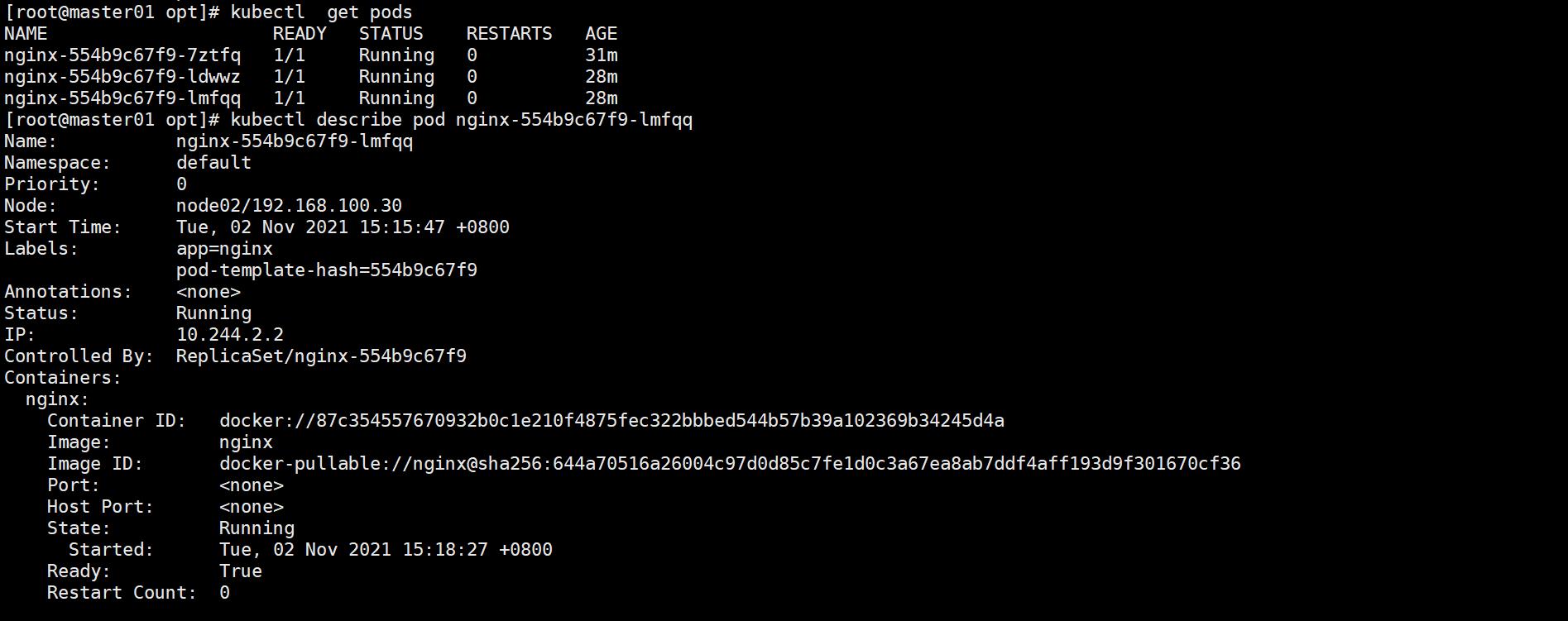
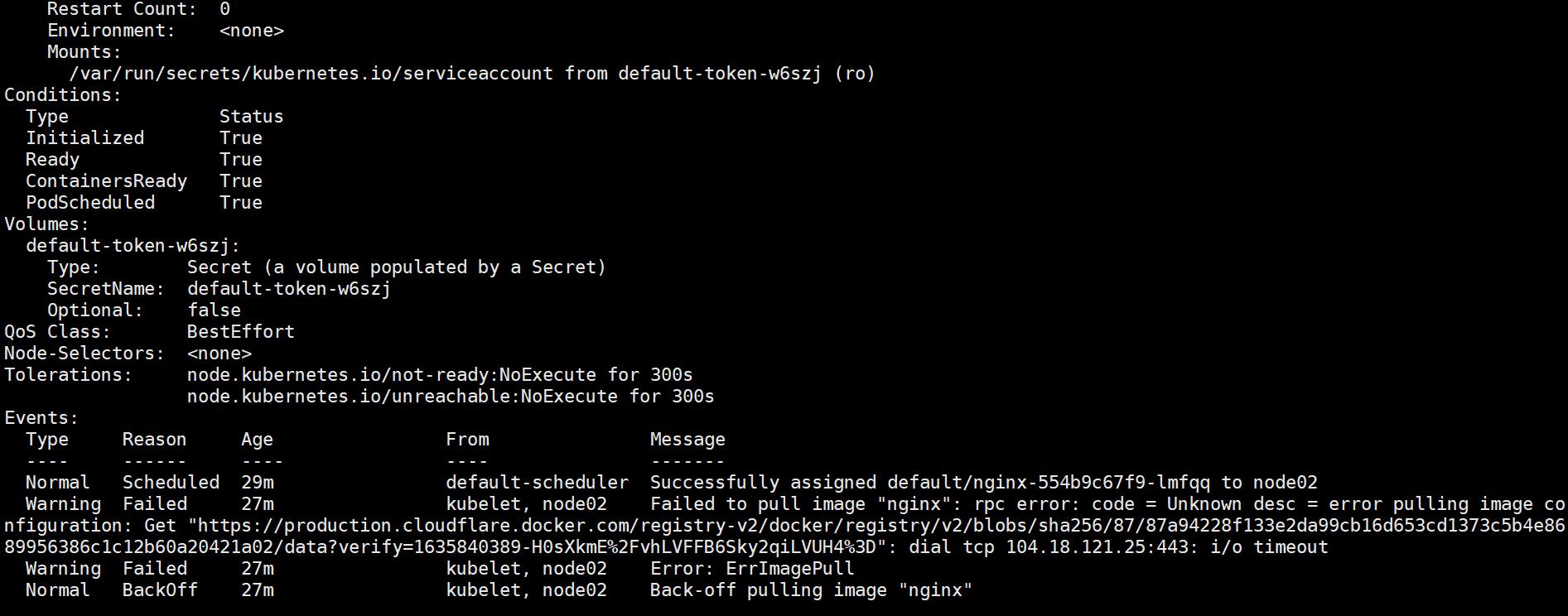

查看default命名空间的所有资源
kubectl get all [-n default]


查看命名空间kube-public 中的pod信息
kubectl get pods -n kube-public
kubectl exec 跨主机登录容器,docker exec 只能在在容器所在主机上登录
kubectl exec -it 容器名 bash -n kube-public
删除(重启)pod资源
由于存在deployment/rc之类的副本控制器,删除pod也会重新拉起来
kubectl delete pod nginx-test-65c98cd596-mhzrz -n kube-public
若pod无法删除, 总是处于terminate状态, 则要强行删除pod
kubectl delete pod nginx-test-65c98cd596-qx6hg -n kube-public --force --grace-period=0
#grace-period表示过渡存活期,默认30s,在删除pod之前允许POD慢慢终止其上的容器进程,从而优雅退出,0表示立即终止pod
扩缩容
kubectl scale deployment -n kube-public nginx-test --replicas=3 #扩容
kubectl scale deployment -n kube-public nginx-test --replicas=1 #缩容
删除副本控制器
kubectl delete deployment -n kube-public nginx-test
kubectl delete deployment/nginx-test01 -n kube-public
三、项目生命周期
项目的生命周期:创建------------->发布----------------------->更新--------------->回滚---------------->删除
3.1 创建 (kubectl run 命令)
- 创建并运行一个或多个容器镜像
- 创建一个deployment或job来管理容器
- kubectl run --help
#启动 nginx实例,暴露容器端口 80 设置副本数 3
kubectl run nginx-demo --image=nginx:1.14 --port=80 --replicas=3
kubectl get pods
kubectl get all
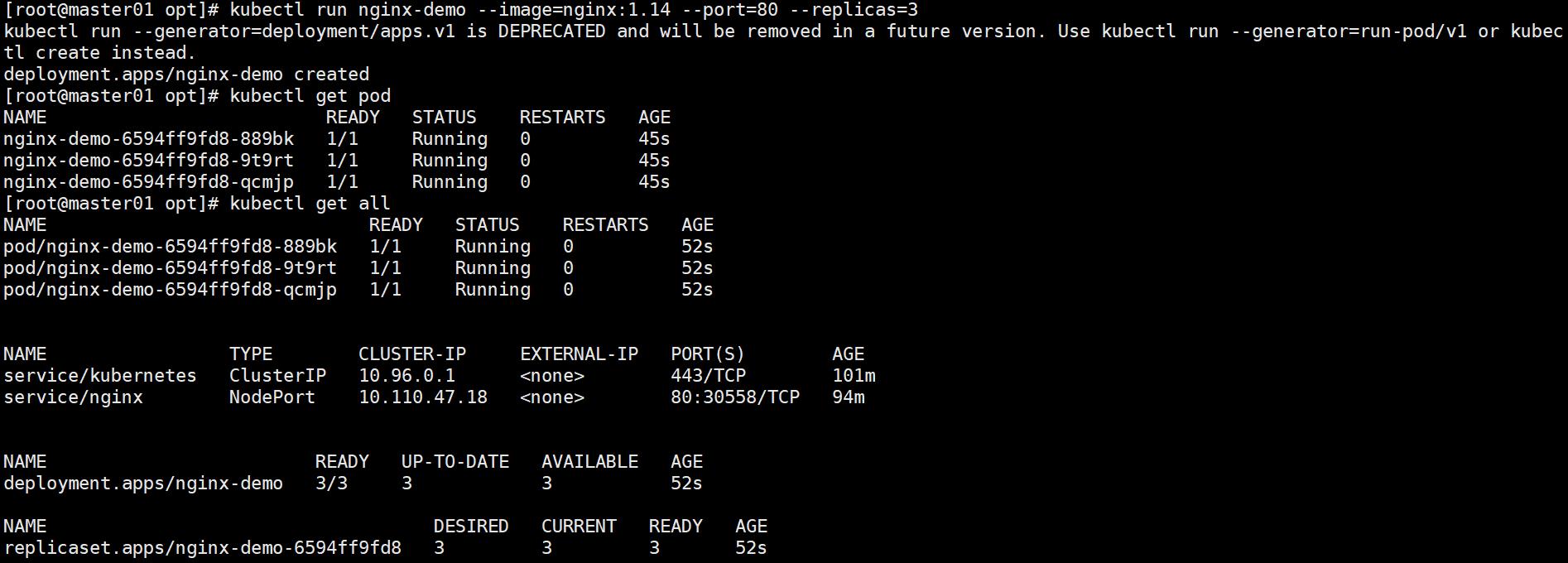
kubectl get pod -w
#跟踪

注意:

3.2 发布(kubectl expose命令)
- 将资源暴露为新的Service
- kubectl expose --help

为deployment的nginx创建service,并通过service的80端口转发至容器的80端口上,service的名称为nginx-service,类型为NodePort,如不指定的话,就是Clusterip
kubectl expose deployment nginx-demo --port=80 --target-port=80 --name=nginx-service --type=NodePort
------------------------------------------------------------------------------------------------------------
Kubernetes之所以需要Service,一方面是因为Pod的IP不是固定的(Pod可能会重建),另一方面则是因为一组 Pod实例之间总会有负载均衡的需求。
Service通过Label Selector 实现的对一组的Pod的访问。
对于容器应用而言,Kubernetes 提供了基于VIP (虚拟IP)的网桥的 方式访问Service, 再由Service 重定向到相应的Pod。
用port映射target-port
service的类型:
- ClusterIP: 提供一个集群内部的虚拟IP以供Pod访问( service默认类型)
- NodePort:在每个Node.上打开一个端口以供外部访问,Kubernetes将会在每个Node上打开一个端口并且每个Node的端口都是一样的,通过NodeIp:NodePort的方式Kubernetes集群外部的程序可以访问Service。
注:每个端口只能是一种服务, 端口范围只能是30000-32767. - LoadBalancer:通过外部的负载均衡器来访问,通常在云平台部署LoadBalancer还需要额外的费用。
#查看pod网络状态详细信息和Service 暴露的端口
[root@master01 opt]# kubectl get pods,svc -o wide
NAME READY STATUS RESTARTS AGE IP NODE NOMINATED NODE READINESS GATES
pod/nginx-demo-6594ff9fd8-889bk 1/1 Running 0 116m 10.244.1.4 node01 <none> <none>
pod/nginx-demo-6594ff9fd8-9t9rt 1/1 Running 0 116m 10.244.2.3 node02 <none> <none>
pod/nginx-demo-6594ff9fd8-qcmjp 1/1 Running 0 116m 10.244.2.4 node02 <none> <none>
NAME TYPE CLUSTER-IP EXTERNAL-IP PORT(S) AGE SELECTOR
service/kubernetes ClusterIP 10.96.0.1 <none> 443/TCP 3h37m <none>
service/nginx NodePort 10.110.47.18 <none> 80:30558/TCP 3h30m app=nginx
service/nginx-service NodePort 10.110.10.193 <none> 80:30948/TCP 103m run=nginx-demo
#查看关联后端的节点
[root@master01 opt]# kubectl get endpoints
NAME ENDPOINTS AGE
kubernetes 192.168.100.10:6443 3h39m
nginx <none> 3h31m
nginx-service 10.244.1.4:80,10.244.2.3:80,10.244.2.4:80 104m
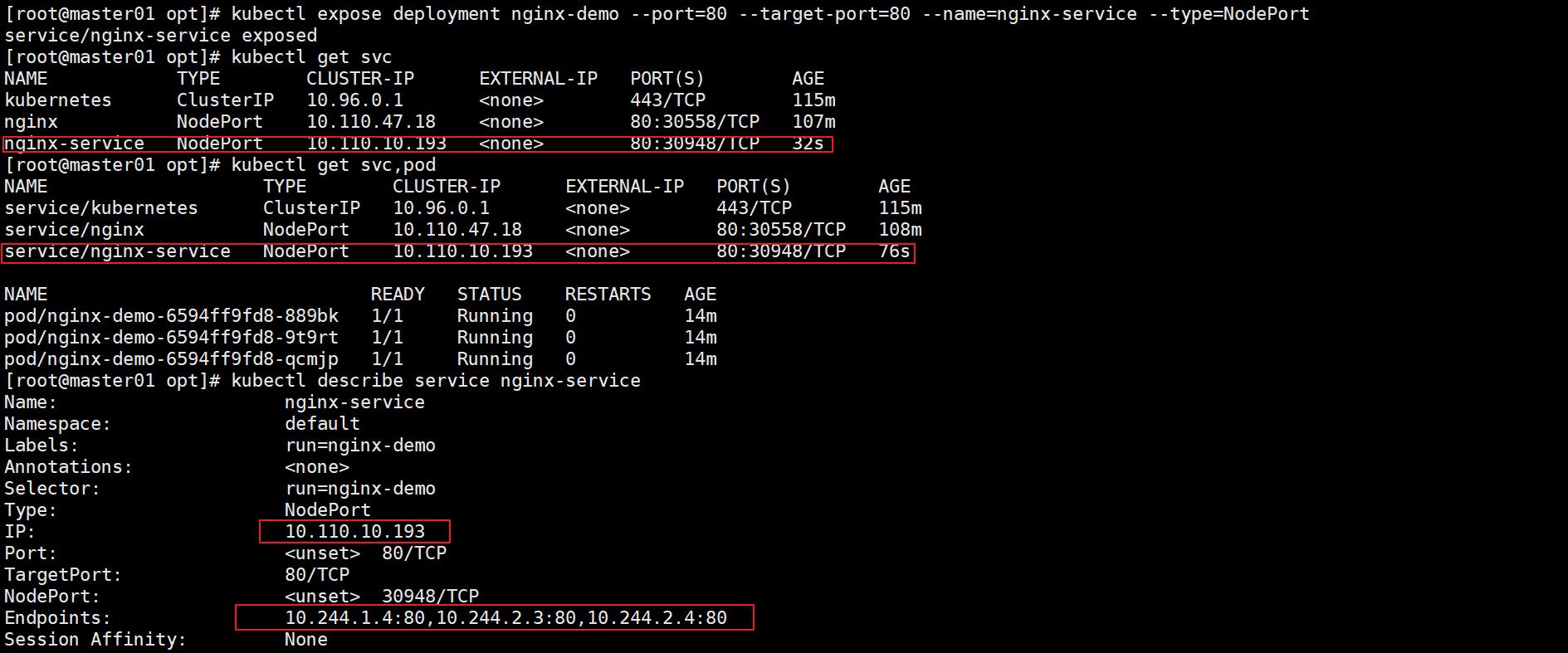


测试负载均衡:


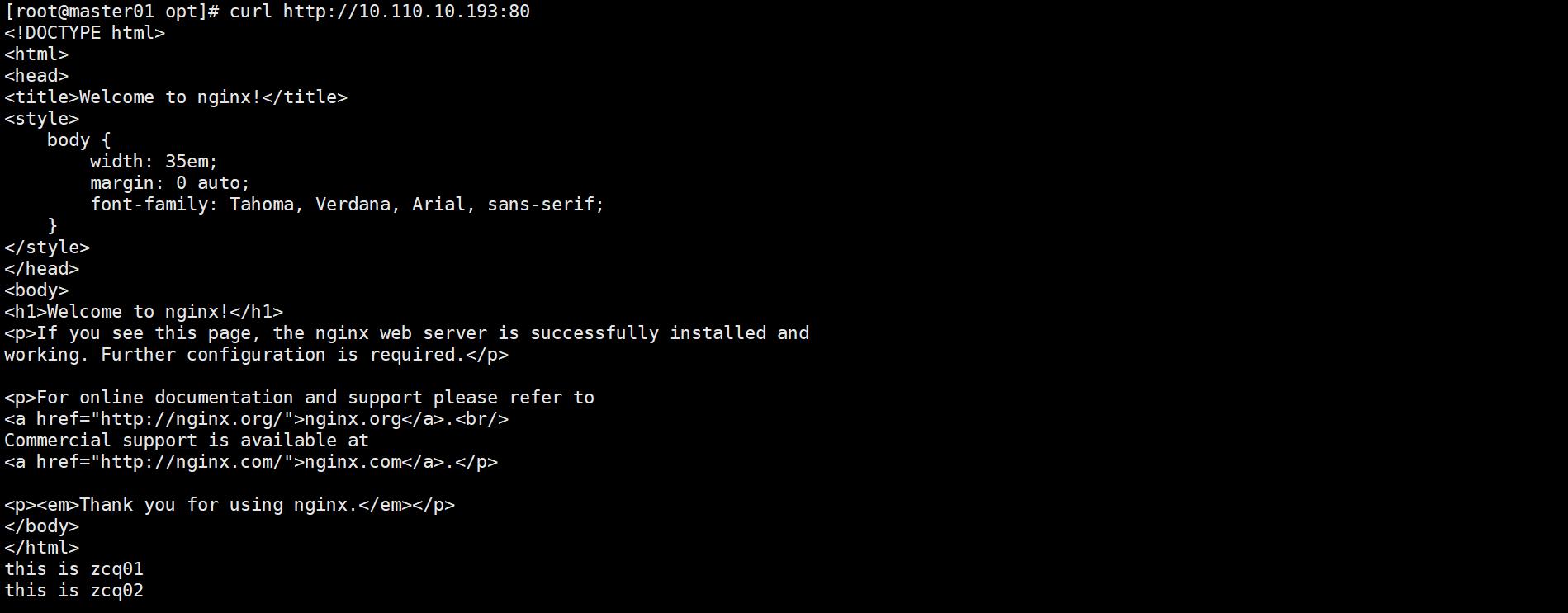
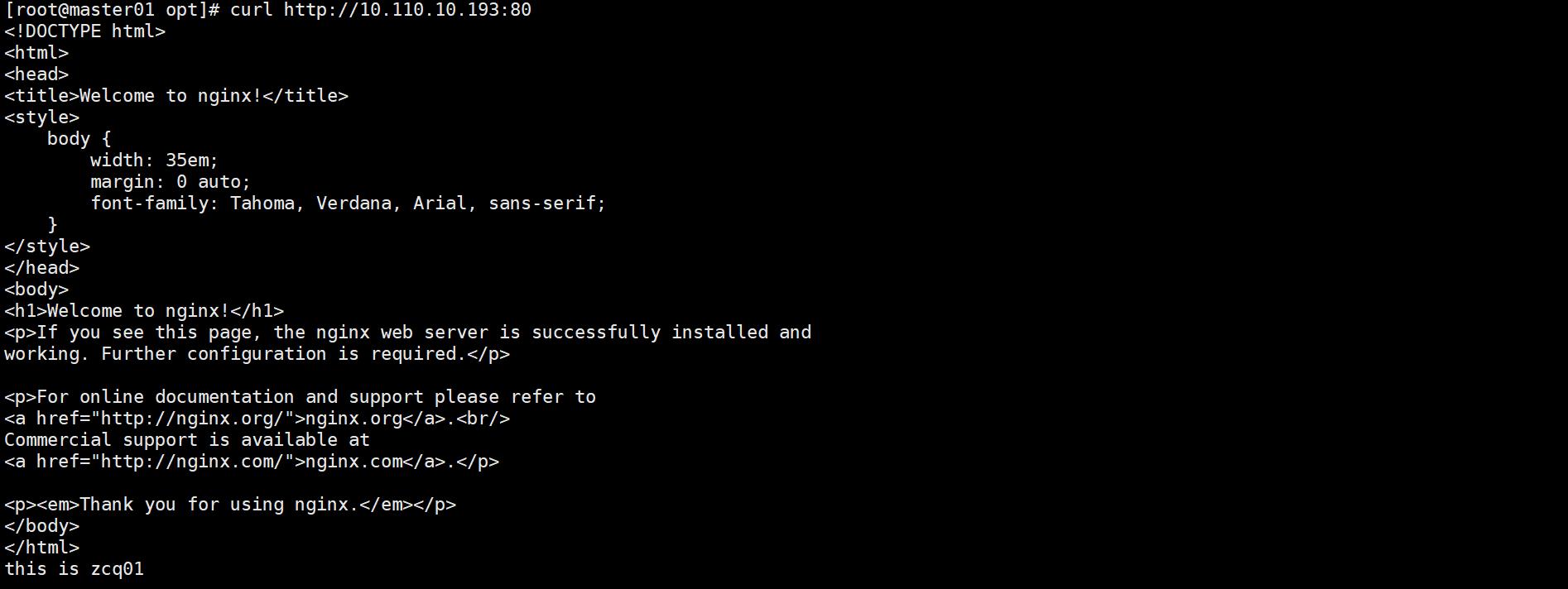



通过ipvsadm查看



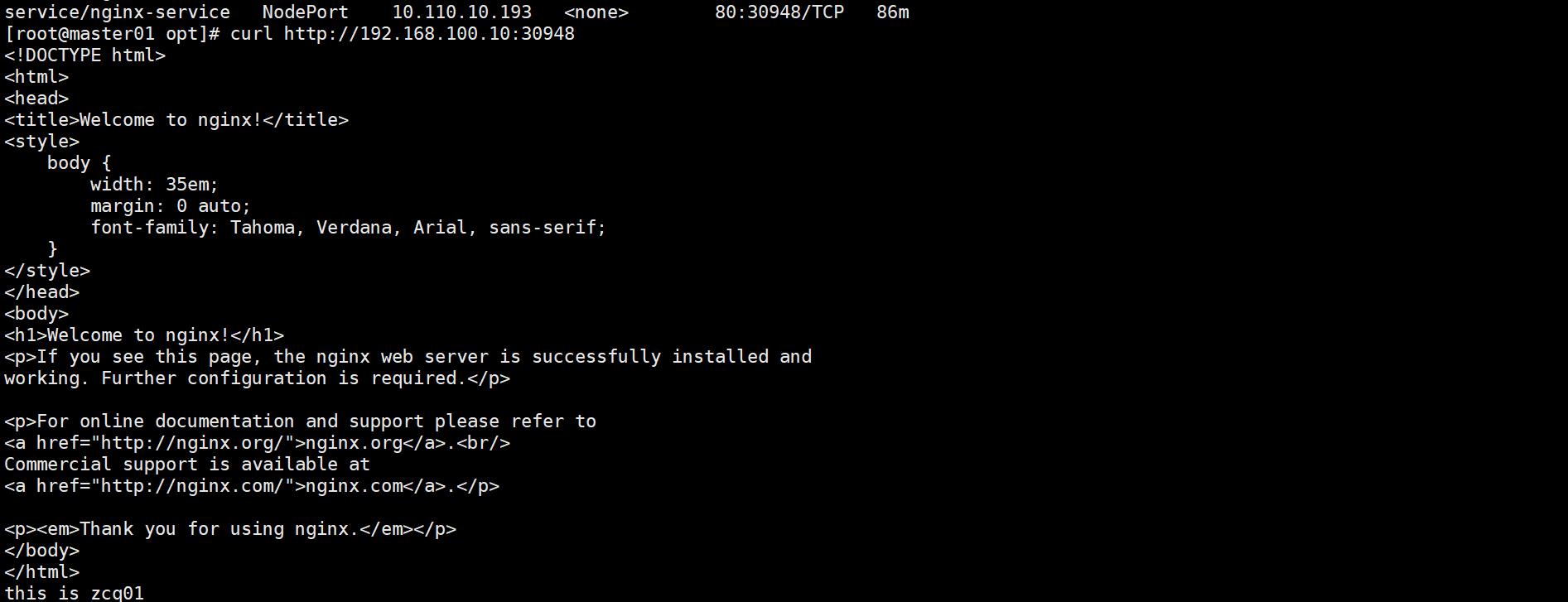
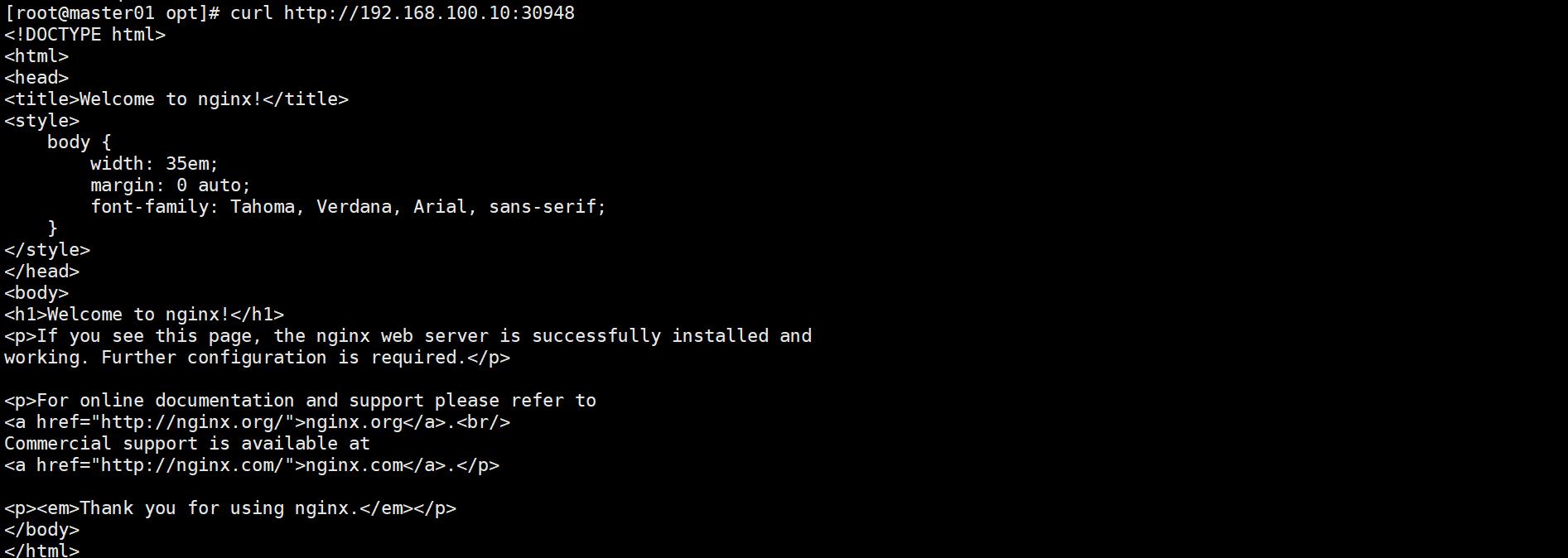
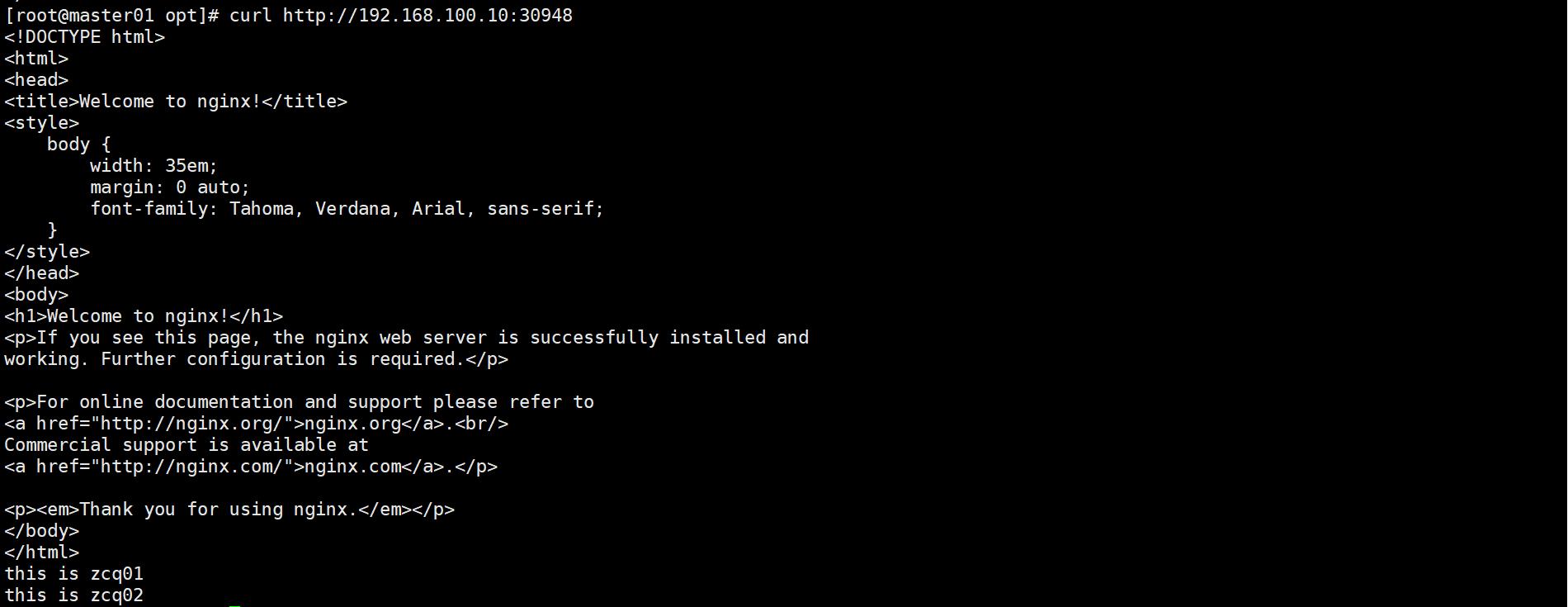
node01上面操作,查看负载均衡端口
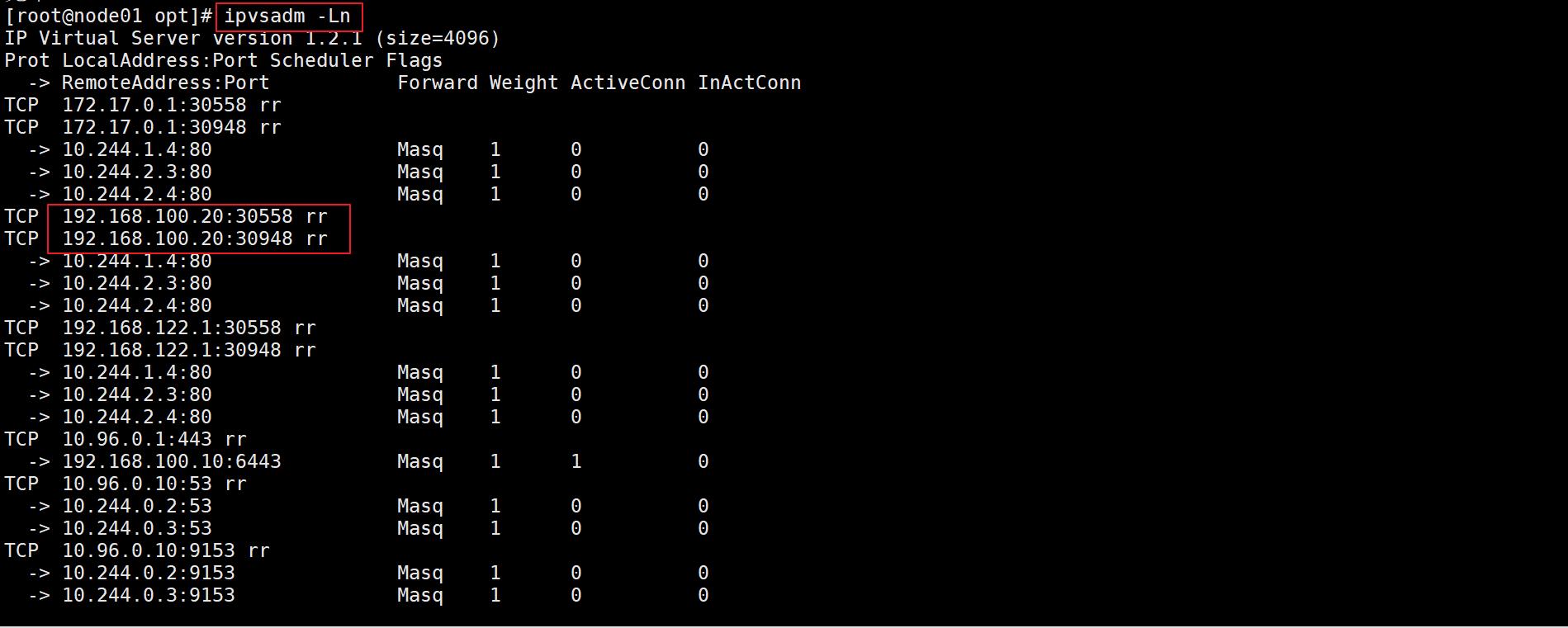
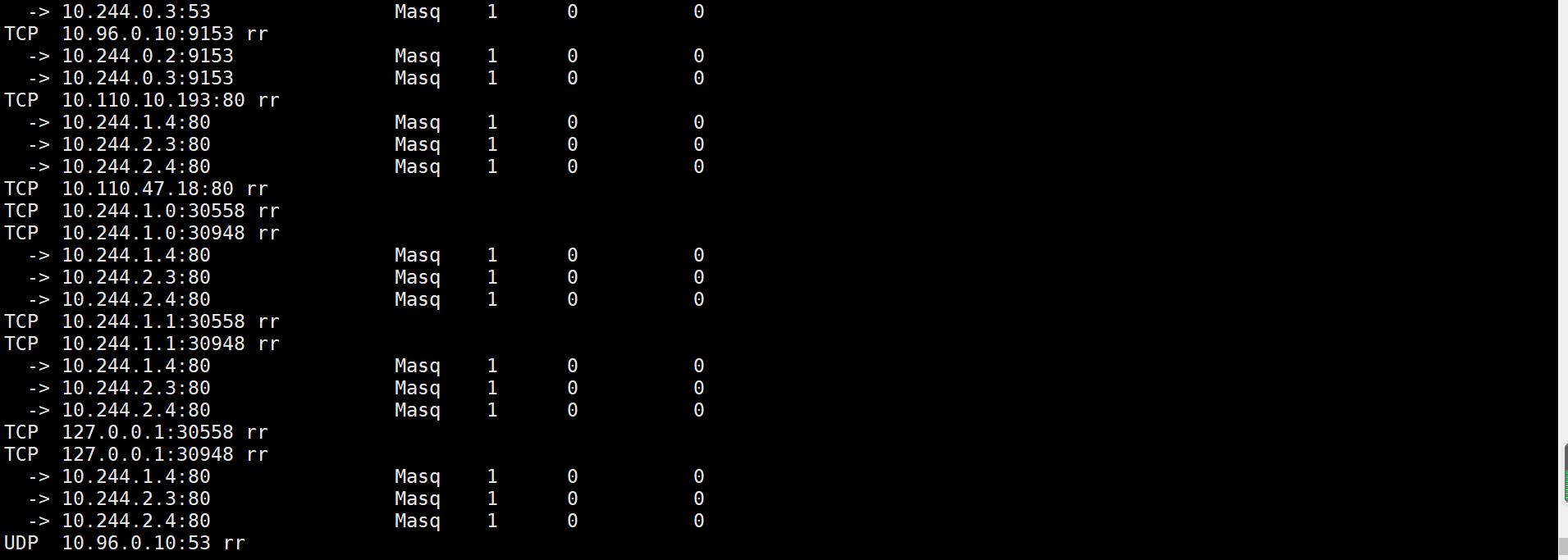
以上说明可以通过nodeIP加端口转发,也可以通过clusterip进行转发
3.3 更新(kubectl set 命令)
- 更改现有应用资源一些信息
- kubectl set --help
## 获取修改模板
kubectl set image --help
Examples:
# Set a deployment's nginx container image to 'nginx:1.9.1', and its busybox container image to 'busybox'.
kubectl set image deployment/nginx busybox=busybox nginx=nginx:1.9.1
## 查看当前nginx的版本号
curl -I http://192.168.80.30:31268
kubectl set image deployment.apps/nginx nginx-demo=nginx:1.15
kubectl get pods
## 更新完后再次查看nginx的版本号
curl -I http://192.168.80.30:31268

查看更新命令的帮助

获取修改模板
kubectl set image --help
Update existing container image(s) of resources.
Possible resources include (case insensitive):
pod (po), replicationcontroller (rc), deployment (deploy), daemonset (ds), replicaset (rs)
Examples:
# Set a deployment's nginx container image to 'nginx:1.9.1', and its busybox container image to 'busybox'.
kubectl set image deployment/nginx busybox=busybox nginx=nginx:1.9.1
# Update all deployments' and rc's nginx container's image to 'nginx:1.9.1'
kubectl set image deployments,rc nginx=nginx:1.9.1 --all
# Update image of all containers of daemonset abc to 'nginx:1.9.1'
kubectl set image daemonset abc *=nginx:1.9.1
# Print result (in yaml format) of updating nginx container image from local file, without hitting the server
kubectl set image -f path/to/file.yaml nginx=nginx:1.9.1 --local -o yaml
Options:
--all=false: Select all resources, including uninitialized ones, in the namespace of the specified resource types
--allow-missing-template-keys=true: If true, ignore any errors in templates when a field or map key is missing in
the template. Only applies to golang and jsonpath output formats.
--dry-run=false: If true, only print the object that would be sent, without sending it.
-f, --filename=[]: Filename, directory, or URL to files identifying the resource to get from a server.
-k, --kustomize='': Process the kustomization directory. This flag can't be used together with -f or -R.
--local=false: If true, set image will NOT contact api-server but run locally.
-o, --output='': Output format. One of:
json|yaml|name|go-template|go-template-file|template|templatefile|jsonpath|jsonpath-file.
--record=false: Record current kubectl command in the resource annotation. If set to false, do not record the
command. If set to true, record the command. If not set, default to updating the existing annotation value only if one
already exists.
-R, --recursive=false: Process the directory used in -f, --filename recursively. Useful when you want to manage
related manifests organized within the same directory.
-l, --selector='': Selector (label query) to filter on, not including uninitialized ones, supports '=', '==', and
'!='.(e.g. -l key1=value1,key2=value2)
--template='': Template string or path to template file to use when -o=go-template, -o=go-template-file. The
template format is golang templates [http://golang.org/pkg/text/template/#pkg-overview].
Usage:
kubectl set image (-f FILENAME | TYPE NAME) CONTAINER_NAME_1=CONTAINER_IMAGE_1 ... CONTAINER_NAME_N=CONTAINER_IMAGE_N
[options]
Use "kubectl options" for a list of global command-line options (applies to all commands).

查看当前ngnix版本号
curl -I http://192.168.100.20:30948
curl -I http://192.168.100.10:30948
curl -I http://192.168.100.30:30948#通过请求头看版本号
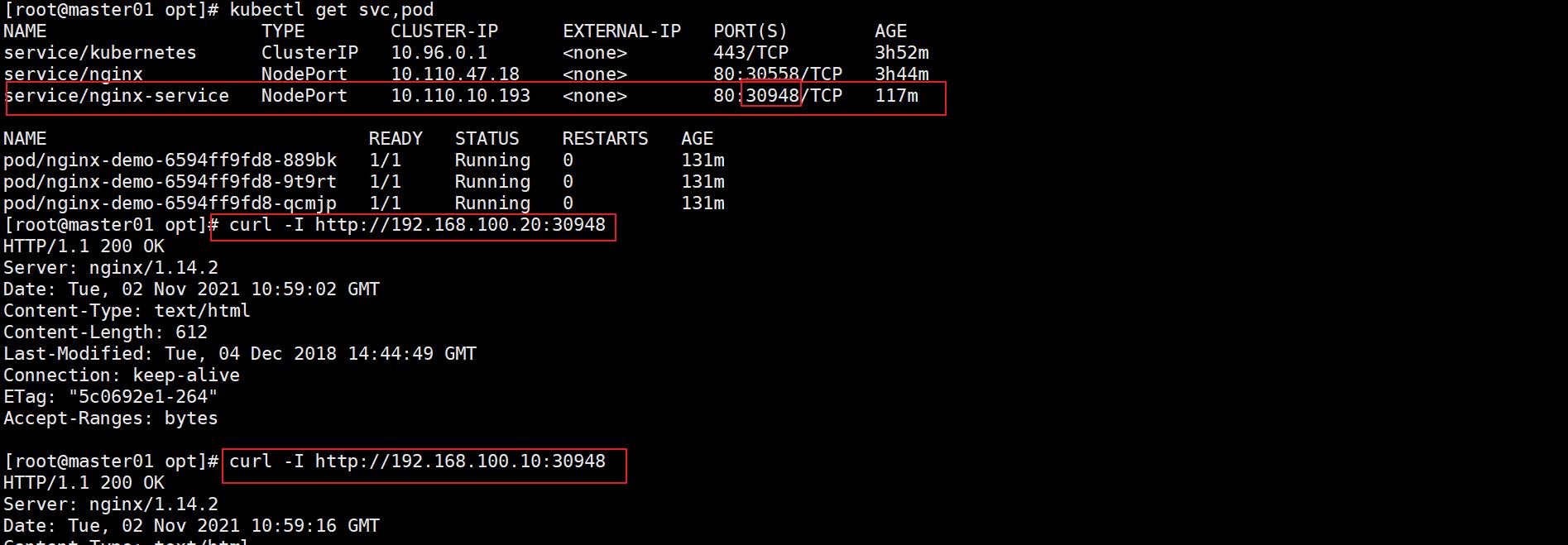
将版本更新到1.15版本
kubectl set image deployment.apps/nginx-demo nginx-demo=nginx:1.15


3.4 回滚(kubectl rollout)
- 对资源进行回滚管理
- kubectl rollout --help
## 查看历史版本
kubectl rollout history deployment/nginx-demo
## 执行回滚到上一个版本
kubectl rollout undo deployment/nginx-demo
## 执行回滚到指定版本
kubectl rollout undo deployment/nginx-demo --to-revision=1
## 检查回滚状态
kubectl rollout status deployment/nginx-demo


3.5 删除 kubectl delete
## 删除副本控制器
kubectl delete deployment/nginx-demo
## 删除service
kubectl delete service/nginx-svc
kubectl get all


以上是关于K8S 中 kubectl 详解的主要内容,如果未能解决你的问题,请参考以下文章